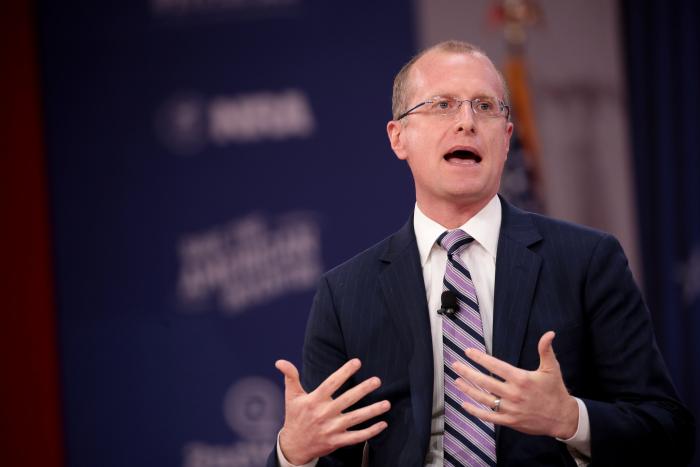
The Real Zuckerberg Challenge: Stop Exploiting Us

Last Wednesday, Facebook founder and CEO Mark Zuckerberg sat down with Harvard’s Jonathan Zittrain as part of his 2019 “challenge” to have more public conversations about the ways the company could better serve people.
The two discussed a range of topics, including “information fiduciaries,” encryption, decentralized services, governance, fighting misinformation and protecting privacy, among other topics.
If you’re thinking that’s a deep list, you’ll be disappointed by Zuckerberg’s comments, which steer clear of specifics and toward platitudes. He often answers a question with a question, an evasive tactic he’s perfected following a year of having to explain company scandals.
Here’s a taste from his explanation of what Facebook decides to prioritize in individual news feeds:
“If you’re talking about what people want to want versus what they want, often people’s revealed preferences or what they actually do shows a deeper sense of what they want than what they think they want to want. There’s a question between when something is exploitative versus when something is real but isn’t what you would say that you want. And that’s a really hard thing to get at.”
Try unspooling that.
Fiduciary sausage making
The discussion of information fiduciaries is particularly troubling. The basic idea is to legally obligate companies like Facebook to be trustworthy stewards of our information. Zittrain, who along with Yale Law School Professor Jack Balkin first championed this concept, writes that making Facebook an information fiduciary requires “a new kind of law — one that clearly states the kinds of duties that online firms owe their end users and customers.”
Congress has yet to seize on this concept and probably for good reason. One can only imagine what that loopholed law would look like at the butt end of the sausage maker. And it doesn’t address a deeper problem with the way platforms like Facebook do business.
In reality, Facebook’s only fiduciary responsibility is to its shareholders; best not kid ourselves otherwise. And for those shareholders the news has been good: The company rode a year of nonstop scandals to record profits, reporting a net 2018 fourth-quarter income of nearly $6.9 billion, up 61 percent from the same period in 2017.
After every scandal Facebook promises to fix the problem, whether that means hiring more fact-checkers or purging bad actors from its network. But if we’ve learned anything over the past year it’s that Silicon Valley in general, and Facebook in particular, are incapable of fixing their problems.
Online platforms are too deeply vested in data collection and targeted advertising to address the multiple harms their economic model presents. It will require public pressure and government action to hold these companies accountable. And that’s a process that’s just beginning.
While Silicon Valley execs like Zuckerberg like to tout their cleanup efforts, they’ve failed to filter the tidal wave of content from billions of active users.
One of the fact-checkers Facebook hired to tackle the deluge of misinformation on its platform later gave up in frustration (as did other fact-checkers working on the project from the Associated Press and Snopes). She reported that truth-testing Facebook posts was “like battling the Hydra of Greek myth. Every time we cut off a virtual head, two more would grow in its place.”
The tiger’s stripes
Throughout Zuckerberg’s 2018 apology tour, he avoided addressing the deeper problem behind the attention economy: Targeted advertising generates hundreds of billions of dollars for online platforms. But such targeted advertising relies on data-harvesting regimes that individuals, groups and government actors have misused in many ways.
Fixes to Facebook systems and standards are insufficient at best. That’s because they ignore one fundamental truth: The creators of the world’s most coercive social networks designed their platforms to work this way.
In other words, Facebook functions by gathering people into like-minded groups and promoting to them the content that will elicit the strongest reaction. The platform then generates revenue by targeting ads that will appeal to these finely targeted communities.
Combine these two elements and you’ve created a billion-dollar formula for manipulation — a formula that Facebook has perfected.
Google has perfected it too, but in a slightly different way. It matches online ads with demographic data it gleans from users’ search histories and Android mobile-phone activities, among other things.
The companies’ immense success is due largely to their capacity to offer up the Holy Grail of advertising: low-cost delivery of ads to very precisely targeted audiences. This ability has revolutionized the advertising industry while concentrating the winnings among the handful of companies capable of such micro-targeting. Facebook and Google control nearly 70 percent of digital-ad revenues in the United States, according to eMarketer.
Facebook algorithms serve the advertising model. Zuckerberg wouldn’t have it any other way. He’s willing to fix certain aspects of his online creation — but not the targeted advertising and related algorithms that drive the entire business.
Asking Facebook to fundamentally alter its advertising algorithms is like asking a tiger to lose its stripes. While it’s good PR for Zuckerberg to have conversations about better serving the public interest, he isn’t serious about fixing the actual problem at the heart of the whole enterprise.





